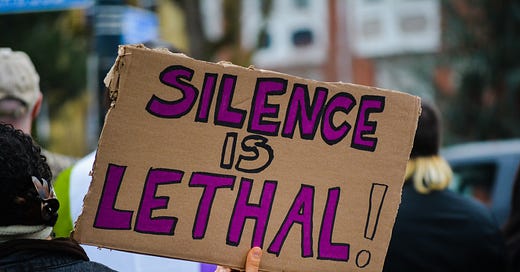I listened to Simon and Garfunkel’s The Sound of Silence this morning. It struck me more deeply than ever before:
“Fools,” said I, “You do not know
Silence like a cancer grows
Hear my words that I might teach you
Take my arms that I might reach you”
But my words like silent raindrops fell
And echoed in the wells of silence
And the people bowed and prayed
To the neon god they made...
Silence can be deafening.
If you turn on the news, you’ll likely hear questions like: Where are the Democrats? Why aren’t they speaking louder?
If you scroll social media, you’ll see memes and calls to action flying past like confetti.
Elie Wiesel once said, “The opposite of love is not hate, it’s indifference.”
Indifference to suffering, injustice, and truth is the rot that allows evil to take hold. History is littered with examples of how complacency, fear, and the failure of imagination can lead us down tragic paths.
So, why is it still so difficult to stand up and speak out?
There are as many reasons as there are people. Among my friends, silence and complicity come up constantly—but so do the raw emotions behind them: fear, anger, disillusionment, and grief.
What exactly are we grieving?
Some of it is our naivete. But that’s only part of it.
For me, it’s the realization that people I love—people I’ve trusted—are willing to accept lies as truth. To tolerate, or even endorse, the dehumanization of others. To dismiss diversity as a threat. To shrug at violence, excuse authoritarianism, and call those of us who believe in justice, equity, and compassion un-American.
I can’t grasp it. It leaves me breathless.
The news sickens me. Watching my own government abandon the values I was raised to believe in—rejecting people like me—is devastating. I’m grieving for the America I thought I knew, for the optimism I once felt, and for the unwavering belief I had in people. That faith has been shaken. And I’m not alone.
Grief is a bitch.
We often think of grief as the loss of a person. But grief is what happens when something cherished is stripped away. It’s what happens when change feels like betrayal—when what’s lost is trust, or hope, or the comfort of familiar beliefs.
Many of us took America’s endurance for granted. We forgot the price our parents, grandparents, and great-grandparents paid to create the life we live. My generation hasn’t faced segregation, world wars, or military drafts. We’ve avoided economic collapse—aside from the recession we largely caused ourselves. The adversity we know has mostly been of our own making.
Greed led to the economic freefall of 2008. Selfishness and inertia have left us counting the bodies of dead children in schools, shoppers in grocery stores, parishioners in churches, and fans at concerts. We’ve let corporations poison water, destroy small farms, and hollow out communities while we looked the other way.
Maybe we’ve been given too much. And perhaps too many of us have given too little in return.
For me—and many of my friends—this moment goes far beyond politics. It’s about humanity.
When did anger become more prized than compassion?
When did “I” become more important than “we”?
The Declaration of Independence doesn’t begin with “I.” It begins with “We, the People.”
Grief makes you want to hide. I’ve been there—living through that ache for years. But death and change are inevitable. The future is not. We are not dead. And neither is America.
She’s waiting—for us.
I think of my ancestors: the ones who boarded the Mayflower, or ships departing Queenstown for New York. My great-grandmother, just twenty-one, made that journey alone. My father served in Korea. My son deployed after the 2011 tsunami. My mother told me stories of her father being drafted into World War II. My grandmother lived through the first one.
None of them held college degrees. They didn’t take luxurious vacations. They worked. They labored in factories, and pulled tobacco. They fought. They marched. They voted. They didn’t do it so I could replicate their experience. They did it so I could dream beyond it.
And I wonder—have I let them down?
The truth is: I’m afraid. I’m an outspoken lesbian who writes about lesbian characters. I know what it means to be targeted. I understand the temptation to pull the covers over my head and cry. I recognize the rage, the despair, and the fear. That’s part of grief, too.
But it only feels like America is lost.
I never expected everyone to share my beliefs. I don’t need them to. But I wonder if some of my fellow Americans truly believe this country belongs to me, too. I can’t force anyone to see my worth. But I can fight for theirs—just as I stand up for mine.
Because that is the America I believe in.
If you’re grieving right now—grieving the country you thought you knew—you’re not alone. I feel it, too. But it’s time to dry our tears, confront our fears, and step into this moment.
No political party will save us. No one leader can deliver us from this.
It’s up to us now.
Change is inevitable.
The death of America is not.






Thanks for always writing what I am thinking and feeling, but don’t have the words to say.